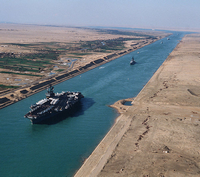The current wave of upheaval in the Arab world that has unexpectedly swept away the long-lasting presidents of Tunisia and Egypt and which may trigger regime changes all over the region has also steepened the ongoing rise in oil prices and raised fears about the stability of the global oil market. On Jan. 31, after five days of upheaval in Egypt, the price of a barrel of Brent crude on the London-based Intercontinental Exchange passed the $100 threshold for the first time since the financial meltdown of September 2008. Brent crude is currently trading for more than $105, while prices in New York for light sweet crude have observed a similar upward trend since the height of the chaos in Egypt. Markets have been nervous about the emergence of two distinct problems: the regular flow of oil tankers through the Suez Canal and the contagion effect of instability in an oil-rich region.
The first problem should not be a concern. Despite the strong emotional impact it would have, closure of the canal would not disrupt the oil trade. Unlike during its blockade in 1973 after the Yom Kippur War, the Isthmus of Suez is no longer a vital chokepoint for the oil industry: Currently, only 2 million barrels per day (mb/d) transit through it, less than 5 percent of world daily exports in 2010. If one adds the crude that transits through the Suez-Mediterranean pipeline connecting the Red Sea and the southern shore of the Mediterranean Sea, the figure rises to between 3 mb/d and 3.5 mb/d. This amount could be easily replaced by the release of oil currently held as inventory, since stockpiles, especially in American hubs, have been at near-record highs for months. Moreover, oil tankers could still bring Middle Eastern oil to major consuming outlets in Europe by circumnavigating the African continent. This would generate a price premium to the benefit of the shipping industry, but not to a degree that would cause a substantial disruption.
In the longer run, the estimated 5 mb/d of spare capacity held by members of the Organization of Petroleum Producing Countries (OPEC) could be brought to market easily, making up for any reasonable supply disruption. Saudi Oil Minister Ali Ibrahim al-Naimi recently said that his country alone currently possesses 4 mb/d of spare capacity, and Riyadh has repeatedly shown a strong interest in the stability of the oil market and in the maintenance of a "price band" no higher than $85 a barrel. In opposing price hawks within OPEC, the Saudi ruling family remembers very well the pain caused by the drop in oil consumption in the 1980s after a decade of sky-high prices and hopes to avoid making the same mistake twice.

